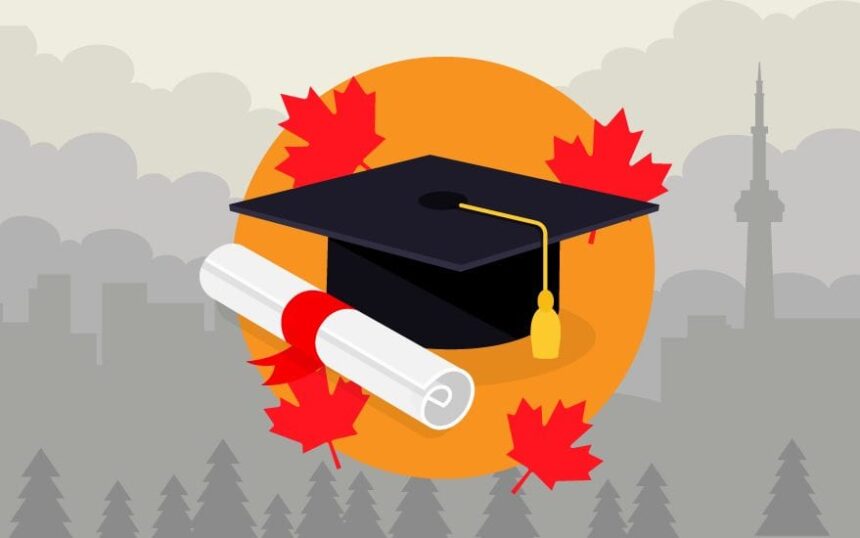Canada, renowned for its high-quality education system and multicultural environment, attracts students from around the globe seeking to pursue advanced degrees. In this post we will dive deep into learning about the Masters Degree Programs In Canada.
Among the myriad of educational opportunities available, Masters degree programs stand out for their depth of study, research opportunities, and career advancement prospects.
In this article, we delve into the world of Masters degree programs in Canada, exploring the offerings, benefits, application process, and key considerations for prospective students.
We're now on WhatsApp. Click here to join.
Why Pursue a Masters Degree in Canada?
The decision to pursue a Masters degree in Canada is influenced by various factors, including the country’s renowned academic institutions, diverse cultural landscape, and vibrant research community.
Here are some compelling reasons why Canada is an attractive destination for postgraduate studies:
- Academic Excellence: Canadian universities consistently rank among the top institutions globally, offering rigorous academic programs and innovative research opportunities across various disciplines.
- Multicultural Environment: With a diverse population comprising people from different ethnicities, cultures, and backgrounds, Canada provides an enriching learning experience, fostering cross-cultural understanding and collaboration.
- Research Opportunities: Masters programs in Canada emphasize research and practical application, providing students with access to state-of-the-art facilities, renowned faculty members, and funding opportunities for research projects.
- Quality of Life: Canada is known for its high quality of life, safety, and welcoming communities, making it an ideal destination for international students seeking a conducive environment for academic and personal growth.
- Global Recognition: A Masters degree from a Canadian institution is widely recognized and respected worldwide, enhancing graduates’ career prospects and opportunities for further academic pursuits.
Types of Masters Degree Programs In Canada
Canadian universities offer a wide range of Masters degree programs catering to diverse academic interests and career goals. Some of the popular types of Masters degrees available include:
- Master of Arts (MA): Focuses on humanities, social sciences, and fine arts disciplines, offering opportunities for critical analysis, research, and creative expression.
- Master of Science (MSc): Emphasizes scientific inquiry, data analysis, and experimentation, with specializations available in fields such as engineering, natural sciences, and technology.
- Master of Business Administration (MBA): Designed for professionals seeking advanced management skills and strategic leadership capabilities in business administration and related fields.
- Master of Engineering (MEng): Focuses on advanced engineering principles, technical expertise, and project management skills, preparing students for roles in industry or further research.
- Master of Education (MEd): Addresses theories and practices in education, curriculum development, and educational leadership, catering to educators and administrators aiming to advance their careers in the field of education.
- Master of Public Administration (MPA): Offers training in public policy analysis, governance, and management, preparing graduates for leadership roles in government, non-profit organizations, and public sector agencies.
Application Process
The application process for Masters degree programs in Canada typically involves the following steps:
- Research and Shortlisting: Explore different universities and programs based on your academic interests, career goals, and eligibility criteria. Consider factors such as program reputation, faculty expertise, and available resources.
- Prepare Application Documents: Gather required documents, including academic transcripts, letters of recommendation, statement of purpose, standardized test scores (such as GRE or GMAT), and proof of English language proficiency (if applicable).
- Submit Online Application: Complete the online application form for your chosen program and university, ensuring accuracy and adherence to deadlines. Pay attention to any specific requirements or additional documents requested by the institution.
- Financial Planning: Explore funding options such as scholarships, grants, assistantships, and student loans to support your studies and living expenses in Canada. Research tuition fees, cost of living, and potential sources of financial aid available to international students.
- Visa Application: Once accepted into a Masters program, apply for a study permit (student visa) through the Government of Canada’s Immigration, Refugees and Citizenship Canada (IRCC) website. Follow the guidelines and provide necessary documentation to facilitate the visa process.
- Pre-Departure Preparation: Make necessary arrangements for travel, accommodation, health insurance, and other logistical considerations before departing for Canada. Familiarize yourself with Canadian culture, customs, and immigration regulations to ensure a smooth transition to your new academic environment.
Key Considerations for International Students
International students pursuing Masters degree programs in Canada should consider the following factors:
- Visa and Immigration Regulations: Familiarize yourself with visa requirements, study permit regulations, and immigration policies governing international students in Canada. Ensure compliance with visa conditions and maintain legal status throughout your stay.
- Language Proficiency: Demonstrate proficiency in English or French by providing standardized test scores (such as IELTS or TOEFL) as per the language requirements of your chosen program and institution.
- Healthcare Coverage: Obtain health insurance coverage either through the university’s student health plan or private insurance providers to access healthcare services during your stay in Canada.
- Cultural Adaptation: Embrace cultural diversity and engage with the local community to enrich your academic experience and broaden your perspective. Seek support from international student services, peer networks, and cultural organizations to navigate cultural adjustment challenges.
- Career Opportunities: Explore internship, co-op, and networking opportunities to gain practical experience and enhance your employability in the Canadian job market. Leverage career services, alumni networks, and industry connections to pursue your career goals effectively.
Conclusion
Masters degree programs in Canada offer a transformative educational experience characterized by academic excellence, research innovation, and cultural immersion.
Whether you aspire to pursue a career in academia, industry, or public service, Canada provides a conducive environment for intellectual growth, personal development, and global engagement.
By embarking on this educational journey, students can unlock their potential, broaden their horizons, and contribute to positive change in their respective fields and communities.
See This: How To Apply For Scholarships In Canada Universities
Frequently Asked Questions (FAQ) On Masters Degree Programs In Canada
What makes Canada a popular destination for pursuing Masters degrees?
Canada is renowned for its high-quality education system, diverse multicultural environment, and excellent research opportunities across various disciplines. Additionally, the country offers a high standard of living, safety, and welcoming communities, making it an attractive destination for international students seeking advanced degrees.
What types of Masters degree programs are available in Canada?
Canadian universities offer a wide range of Masters degree programs catering to diverse academic interests and career goals. Some common types include Master of Arts (MA), Master of Science (MSc), Master of Business Administration (MBA), Master of Engineering (MEng), Master of Education (MEd), and Master of Public Administration (MPA), among others.
How do I apply for a Masters program in Canada?
The application process typically involves researching and shortlisting universities and programs, gathering required documents (such as transcripts, recommendation letters, and test scores), completing the online application form, arranging funding through scholarships or loans, obtaining a study permit (visa), and preparing for departure.
What are the language requirements for international students applying to Masters programs in Canada?
International students may need to demonstrate proficiency in English or French, depending on the language of instruction at their chosen university. This often involves providing standardized test scores such as IELTS, TOEFL, or DALF for French proficiency.
Are there financial aid options available for international students pursuing Masters degrees in Canada?
Yes, there are various funding options available to support international students, including scholarships, grants, assistantships, and student loans. Many Canadian universities offer merit-based scholarships and bursaries specifically for international students, while government agencies and private organizations also provide financial assistance.
What support services are available for international students at Canadian universities?
Canadian universities offer a range of support services for international students, including academic advising, language support programs, counseling and mental health services, housing assistance, career development workshops, and orientation programs to help students acclimate to their new environment and succeed academically and personally.
How can international students adapt to the Canadian academic and cultural environment?
International students can adapt to the Canadian academic and cultural environment by actively participating in campus activities, joining student clubs and organizations, engaging with diverse peer networks, seeking support from international student services, and exploring Canadian culture and customs through cultural events and experiences.
How long does it take to complete a Masters degree program in Canada?
The duration of Masters programs in Canada varies depending on the university, program structure, and field of study. Typically, a full-time Masters degree can be completed in one to two years, while part-time options may take longer to finish.
Can international students work while studying for their Masters degree in Canada?
Yes, international students with a valid study permit are generally allowed to work part-time (up to 20 hours per week) during the academic year and full-time during scheduled breaks. Additionally, some Masters programs may include co-op or internship opportunities that allow students to gain practical work experience related to their field of study.
Follow our Website: On WhatsApp || Twitter || Facebook || Telegram || Townflex || Townflex || YouTube 1 || YouTube 2 || Google News ||





